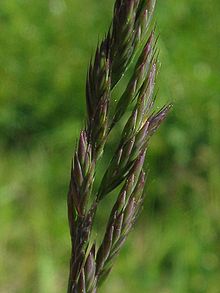Festuca rubra
| Red fescue | |
|---|---|

| |
| Spikelets and flowers | |
| Scientific classification | |
| Kingdom: | Plantae |
| Clade: | Tracheophytes |
| Clade: | Angiosperms |
| Clade: | Monocots |
| Clade: | Commelinids |
| Order: | Poales |
| Family: | Poaceae |
| Subfamily: | Pooideae |
| Genus: | Festuca |
| Species: | F. rubra
|
| Binomial name | |
| Festuca rubra | |
| Synonyms | |
| |
Festuca rubra is a species of grass known by the common name red fescue,[1] creeping red fescue or the rush-leaf fescue. It is widespread across much of the Northern Hemisphere and can tolerate many habitats and climates. It is best adapted to well-drained soils in cool, temperate climates; it prefers shadier areas and is often planted for its shade tolerance.[2][3] Wild animals browse it, but it has not been important for domestic forage due to low productivity and palatability.[2] It is also an ornamental plant for gardens.
Description
[edit]Festuca rubra is perennial and has sub-species that have rhizomes and/or form bunchgrass tufts. It mainly exists in neutral and acidic soils. It can grow between 2 and 20 cm tall.
Like all fescues, the leaves are narrow and needle like, making it less palatable to livestock. The swards that it forms are not as tufted as sheep's fescue (Festuca ovina) or wavy hair grass (Deschampsia flexuosa). The tufted nature is what gives the grass its springy characteristic. The leaves are bright green.
Flowers
[edit]There are 4 to 10 spikelet flowers, which are up to 15 mm long.
The ligule is very short and blunt.[4]
Cultivation
[edit]Festuca rubra, as red fescue or creeping red fescue, is cultivated as an ornamental plant for use as a turfgrass and groundcover. It can be left completely unmowed, or occasionally trimmed for a lush meadow-like look. There are many subspecies, and many cultivars have been bred for the horticulture trade.
-
The ligule is very short and blunt.
-
Festuca rubra
See also
[edit]References
[edit]- ^ BSBI List 2007 (xls). Botanical Society of Britain and Ireland. Archived from the original (xls) on 2015-06-26. Retrieved 2014-10-17.
- ^ a b "Plant Fact Sheet – Creeping Red Fescue" (PDF). United States Department of Agriculture. Retrieved 2012-01-16.
- ^ "Healthy Lawns – Red Fescue". University of California. Retrieved 2012-01-16.
- ^ "Festuca rubra – Red fescue" (PDF). BSBI. Retrieved 2010-11-16.
External links
[edit]- Festuca Rubra, detailed ecology at the Fire Effects Information System, US Forest Service
- Festuca rubra in the CalPhotos photo database, University of California, Berkeley
- Jepson Manual Treatment: Festuca rubra
- "Tips for Fine Fall Fescue" Archived 2009-01-07 at the Wayback Machine, article at Learn2Grow.com
- USDA Plants Profile – Festuca rubra


